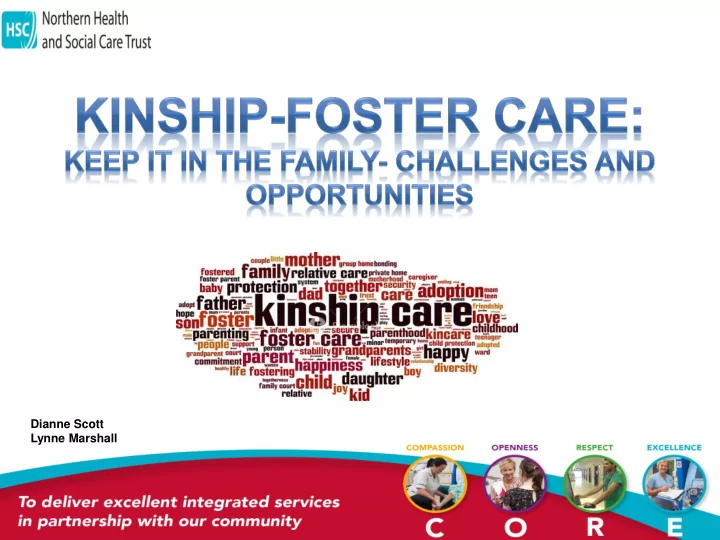

Dianne Scott Lynne Marshall
KINSHIP CARE “Kinship Care can be a positive permanency option as it enhances children's sense of belonging through continuity of family identity which is a key factor in terms of placement stability.” (Farmer & Moyers)
SCOPING Lack of appropriate matching / multiple moves Need for specific Kinship Team Need to identify appropriate staff Early Intervention Signs of Safety Model Family Group Conference Capacity and demand – timescales Support Court process Training / Supports Residence Orders – future planning
Thinking outside the box Individual / bespoke assessments Threshold of risk One size does not fit all Welfare child is paramount – safe & protected Psychological permanence Open and honest working relationship Empowering families Bringing FSIT / LAC colleagues along Pitch right level Language Placement viable & robust
KINSHIP CARE VS STRANGER FOSTER CARERS Research has shown that Kinship carers are more likely to remain committed to caring for children in challenging circumstances, than Stranger foster carers. However, as placement quality can suffer as strain increases, there is a need to provide adequate services to support these placements, (Farmer, 2010). Indeed, it has been found that where services are provided, both children and their relative carers experience better outcomes in terms of well-being and longevity of placement, (Hsuan-Lin, 2014; Bell & Romano, 2017). Whilst a local longitudinal study found that Adoption and Residence Orders afforded the greatest stability for young children received into Care, considerable levels of placement stability were evident within Kinship placements with 78% of children remaining in Kinship placements over a five year period, compared to 69% of children staying in one foster placement over the same period, (McSherry et al, 2018).
ACHIEVEMENTS – SO FAR Since the Team was up and running in January 2019 we have made it a priority to approach training in a different manner. Fostering Network As part of our collaborative working, The Fostering Network worked alongside us to organise a coffee morning to welcome our new kinship carers. We used this forum to educate them around issues such as; support, finance and other key areas. .
VOYPIC From within the team we have set up a working group, alongside VOYPIC staff to establish better working relationships with our carers. We have started this through social activities such as; bowling, a farm day and a beach barbeque. This social forum enables us to touch on areas such as; training and support groups.
KINSHIP NI Kinship NI have visited the team a number of times, they have offered financial support to our carers and have advised us about useful resources for our carers such as; support groups and training. MENS ROLE IN KINSHIP We have identified that men are a challenging group to engage in terms of training and support. As such, we are starting a men's group to specifically target their needs in the caring role .
CONCLUSION Band 4 staff are approaching cases with a hands-on approach; such as; boundaries, home standards and assisting with homework's. This often makes a difference in sustaining placements and maintaining acceptable standards. To date there has been some trial and error in what is working for us. Our Kinship Steering Group is assisting us to navigate these on a regular basis. We are also seeking the voice of the carers to establish what they feel is working/ not working.
CONCLUSION We are in the early stages of our centralised kinship service/ team being managed under one umbrella. We have a team of social workers who are passionate about kinship care and are committed to improving the service offered to the children and their carers. Its clear that the cases we are looking at are much more complex, more bespoke assessments are required, with higher levels of support needed from the outset to ensure the child is in a safe environment. We are in the process of training Band 4 staff in areas such as; Incredible Years Parenting and therapeutic parenting approaches.
Recommend
More recommend